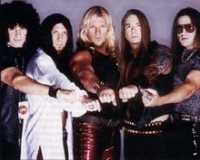It’s very rare for a rock band to have an effect so large that they become an influence on an entire country. The list is short. The Rolling Stones, The Beatles, Led Zeppelin and of course, Fozzy.
That’s right . . . Fozzy.
For even though the purchase of this CD and the reading of these notes may be your first introduction to the band, they are like emperors in my country. They are a part of Japanese culture. It is for that reason that I and millions of other Nippon Fozzy fans are saddened and reluctant to see them leave our country, yet proud and triumphant to see them finally have
the opportunity to achieve the recognition and success that they deserve in the United States. It is finally now, that they are able to return home to the country that shunned them and release the album that all of you should have heard many years ago! How many years you say? Almost twenty to be exact.
It was in the spring of 1981 that my fledging music magazine, Riot Patch, arranged an interview with the members of Fozzy. It was on that day that I first experienced the genius of Moongoose McQueen, the vision of Duke LaRüe, the lunacy of Sports Pop and KK LaFlame and the fleet fingeredness of Chuck Barry (no relation). It was on that day that I was made aware of a band that had invented a radical new style of music known as Heavy Metal. It was on that day that I was told of the indifference shown to them by US record companies, both big and small. It was on that day that I heard about their iron clad contract signed with the multiconglamerate known as Big Happy Mountain Rock Records and it’s mogul Masami “Sammy” Tomami. Most importantly, it was on that day that I became their biggest fan.
It wasn’t more than three weeks later that Big Happy Mountain Rock Records went out of business and Sammy went into seclusion, taking all of the label’s remaining funds and the hopes and dreams of those five 18 year old kids with him.
Fozzy was stranded in a foreign country, with no money, no label and worst of all, a 20-year contract that prohibited them from leaving Japan or getting another deal. To this day Moongoose and the Duke are still grieving over the fact that each thought the other had read the contract before signing it. But just like the conquering East Belgian battleship from where they got their name, Fozzy decided to conquer their adopted new home.
Securing menial jobs for paltry wages, Fozzy put together enough yen (and I was able to pull enough strings) to record demos at the famed Sounds Castle Magic Studios in downtown Shizuoka. The demos featured some of the greatest heavy metal songs ever written, some of which (The Prisoner, Live Wire, Stand Up And Shout) are featured on this very album.
Shortly thereafter, the word started getting out around Tokyo, that an American band that called Japan home had created a sound so heavy and melodic, so aggressive and technical, so ICHIBAN, that it would change the world of music as we knew it. . . and it did.
Bootlegs of the demos started to make their way overseas and into the hands of American and European bands. When those bands’ songs failed to match the originality and the majesticness of Fozzy’s, they committed the unthinkable. Knowing that the band was stranded in Japan for the next two decades, they stole the songs and claimed them for their own!
The sound exploded worldwide and out of the brilliance of Fozzy’s work came the New Wave Of British Heavy Metal, the German power metal movement and the entire US street metal, thrash metal, glam metal and smoking jacket metal scenes.
Fozzy’s influence was everywhere, even though only a handful of people in North America knew where it originated. But millions of Japanese fans knew where it originated from and treated their heroes accordingly. Fozzy’s popularity became second to none and it is my honor to say that Riot Patch Magazine was there all along, throughout the good times AND the bad times.
We were the ones who exposed the band (via the “American Metal Banzai” 12-inch sampler) to the horrifying truth that they were being ripped off by the overseas bands. We were the ones who broke the news of Chuck Barry’s (no relation) terrible sumo accident that forced the band to fire him. We were the ones who sponsored the atrocity that became known as the Osaka Incident. We were the ones who in the early 90’s, indulged Fozzy’s detour from metal into the slow, plodding musical style that the band called “overcast rock,” which was stolen and subsequently called grunge. And we are the ones who wish Fozzy the ultimate in success away from the land of the rising sun, a land that will forever be indebted to the contributions that they have given us over the last twenty years.
Just as the ancient samurai warrior Chikyo once said, “Fly free mighty eagle and reclaim the crown which is yours,” I say “You have broken loose of the chains that bound you, now go and conquer the world that has denied you your glory!”
Watch out America, your world is about to change. . .
Shoji Mochizuki Editor, Riot Patch Magazine July, 2000
